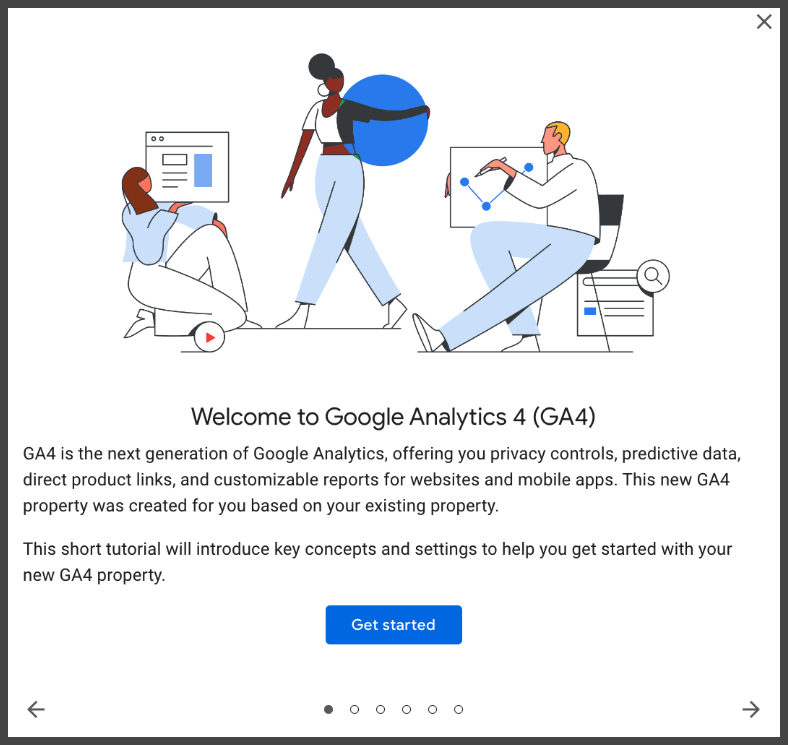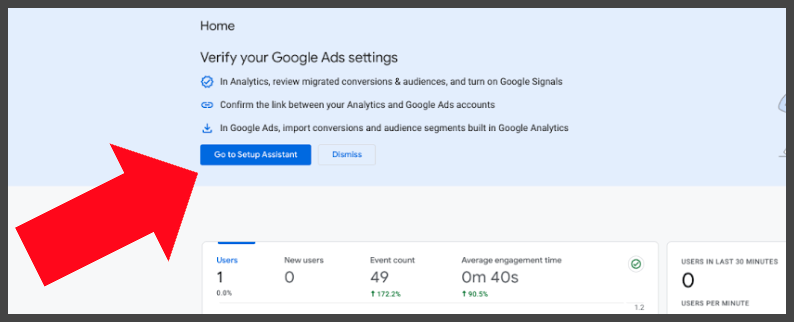

Google cut the link between GA4 and Google Optimize. GA4 gains regex event creation and home dash features, whilst Google remove many attribution ******.
During April 2023, these are some of the highlights so far:
- Google Removes GA4 / Google Optimize Integration
- Mobile Apps & Web Analytics Market to Grow from $9.4 Billion to $20.2 Billion by 2027
- New GA4 Home Dashboard Features
- Adobe Analytics Data shows Inflation Fell in March
- Google to Force Usage of Data-Driven Attribution Model
- GA4 Now Supports Event Creation via Regex
Read on for our take on the analytics market in April.
Google Removes GA4 / Google Optimize Integration
Posted April 24th on Martech
During our last analytics news update in February 2023, we noted that Google Optimize would soon be sunsetting and that Optimizely were stepping up to fill that gap. So really, this is a continuation of that same story.
Posting on Martech, Samantha Barnes comments:
“Google will be removing the Google Analytics 4 integration with the A/B testing and personalization tool, Optimize. In fact, the entire platform is shutting down and sunsetting in September 2023. If you’re using it in any way beyond GA, it will affect your strategy. If you don’t use Optimize, your strategy can transform and evolve with this change.
The GA4 integration with Optimize, is capable of sending data to and from the platform. It links to your GA4 properties to unlock additional reporting and more importantly, to act on data from audiences’ behavior on your sites.”
However, it’s not all doom and gloom. Samantha adds the following:
“Now, the good news. A recent announcement has confirmed that something much bigger and better is coming soon. There will be new integrations with Google Analytics 4, including popular platforms Optimizely, VWO, and AB Tasty. It doesn’t stop there. There’s essentially unlimited opportunities for integrations. A public API will be available that will allow any third-party experiment tool to connect to GA4.”
Whilst the loss of Google Optimize (Google’s A/B testing platform) will be a blow to many, the hope is that Google will be integrating similar technology directly with GA4. We had hoped that this would mean, much of Google Optimize’s testing capabilities would instead be issued from inside of Google Analytics. However, that doesn’t seem to be the case.
Here’s what Dennis van der Heijden (writing on Convert’s blog) had to say:
“Google confirmed today what many had feared: Google Optimize will not be making a return in Google Analytics 4 (GA4). The initial sunset announcement from January 20th has been revised to clarify this, signalling a shift in focus towards investing in third-party A/B testing integrations instead.”
However, Google will be making the GA4 API available to selected 3rd party A/B testing providers (like Optimizely).
Main takeaway: The link between Google Optimize and GA4 is going to be severed. Google Optimize will also be shutting down soon. Google are not going to ingest that technology directly into GA4, as some had speculated. Instead, Google will provide the GA4 to selected 3rd party A/B testing providers.
Mobile Apps & Web Analytics Market to Grow from $9.4 Billion to $20.2 Billion by 2027
Posted April 21st on Yahoo News (UK)
It’s shocking just how quickly the web analytics market is growing. From $9.4 billion (USD) in 2022, to $20.2 billion in 2027 – those are the projected figures. That’s an increase of 114.89%, over just five years.
The study makes further comment:
“Due to the increasing adoption trend among numerous SME sectors, the United Arab Emirates and Saudi Arabia are anticipated to have significant development in the upcoming years. Cloud will play a crucial role in enabling new platforms, services, and facilities that governments and businesses want to enable as digitalization occurs throughout the area.
The rapid growth of the internet has changed the way customers shop. Many customers are using various mobile apps and websites for online shopping, and this trend is growing exponentially. With the growing use of smartphones, the use of the internet is also growing, which has created vast scope for retailers to sell their products online.”
Some of this won’t sound new or shocking to our more seasoned readers. Cloud products and services are certainly changing the world, but they’re not exactly the new kid on the block. The growth of the internet will seem like old news to many, but it’s still a valid observation. Whilst the internet is no longer shiny and new, it continues to grow rapidly. As the population of Earth burgeons, as the internet becomes more accessible (at least, in terms of accessing the web) – there are then more documents and web-users.
So, whilst the web may not seem ‘cutting edge’ any more, it still exhibits strong growth in terms of commercial activity, usage and available materials. Combine the growth in networked documents (architectural complexity) with an increasing need (due to poor economic outlook) to make the most of available data… well, it’s not hard to understand why the field of web analytics is projected to grow so quickly.
More business owners need to craft and tailor, unique and personalised experiences for their users (to boost conversion rates). Every year, the web gets deeper and more complex, making meaningful extraction of data harder. And yet, the web-audience grows ever larger. This means that web analytics is now integral, where it used to be somewhat of a luxury or subjective addition.
Main takeaway: Web analytics is experiencing massive growth. More business owners are tapping into web data, to help refile and personalise their digital experiences, thus bolstering conversion rates. Since the economic outlook is poor, more data means more power. Will you be left behind?
New GA4 Home Dashboard Features
Posted April 20th on Search Engine Land
You can read Google’s official announcement here:
These new features break down into four separate additions:
New welcome tutorial

“Google Analytics adds a short tutorial to the Home page for new Google Analytics 4 users that introduces key concepts and settings to get you started with your new property.”
New banner along the top of the home page

“Editors and Administrators who advertise with Google Ads using Google Analytics data will now see a banner titled “Verify your Google Ads settings” along the top of the Home page. The banner lists the key tasks you must complete to bid against your Google Analytics 4 data. The banner goes away when you mark all the tasks as complete in Setup Assistant.”
Improvements to the Suggested for you section
“The “Suggested for you” section now provides you with cards that are popular across all Analytics properties (to help new Google Analytics 4 users get started) and cards that you keep returning to.”
Dismiss suggestions, insights, and recommendations
“If Analytics surfaces a card in the “Suggested for you” or “Insights & recommendations” section that isn’t relevant to you, you can dismiss the card by clicking the thumbs down button. Based on your input, Google Analytics can better curate the Home page for you in the future.
When you click the thumbs down button, Analytics will now remove the card from your Home page and you won’t see the card again for the next 30 days. Note that the card will remain in view for the remainder of your session if you don’t submit the feedback form that appears after you click the feedback button, but the card will be removed in future sessions.”
Main takeaway: Google continue to refine and improve upon the GA4 interface. As well as fixing various bugs and issues, Google are always on the look out to introduce (and test) new features.
Adobe Analytics Data shows Inflation Fell in March
Posted April 10th on Chain Store Age
Very interesting news, which we found posted on Chain Store Age. Adobe release regular information from their Adobe Digital Price Index (DPI). The information is based on data harvested via Adobe Analytics.
Writing on Chain Store Age, Dan Berthiaume (Senior Editor of Technology) puts thing into perspective:
“Online prices in March 2023 fell 1.7% year-over-year (YoY), marking the seventh consecutive month of YoY price decreases, according to the Adobe Digital Price Index (DPI), based on Adobe Analytics. More than half of the categories (10 of 18) tracked by Adobe saw falling prices on an annual basis. On a month-over-month (MoM) basis, Adobe data indicates online prices in March remained flat (up 0.03%).
Adobe data reveals that YoY price decline was driven by steep drops in categories such as electronics (down 12.9% YoY, down 1.3% MoM) and toys (down 6.6% YoY, down 1.2% MoM). Prices also fell YoY in home goods categories. Appliances were down 4.9% YoY (up 0.8% MoM), while home & garden products fell 4.9% YoY (down 0.3% MoM), and the furniture & bedding category fell 0.9% YoY (down 0.3% MoM).”
This is good news for online shoppers, particularly in the US, as it means that the cost of e-commerce purchases is dropping. However, there were still some categories where prices were increasing. Notably: groceries, personal care, electronics and apparel.
Main takeaway: Strong data from Adobe suggests that in the US, the cost of e-commerce purchases is (on average) decreasing. We’re writing from the UK, where things are a bit more hectic at the moment. Still, online economic movements in the US usually spread (particularly through Europe and the UK). It’s just a matter of time.
Google to Force Usage of Data-Driven Attribution Model
Posted April 6th on Search Engine Land
Gradually, we’re moving to a position where Google Analytics 4’s ‘data driven’ attribution model, will be the only attribution model available.
These are the current, available GA4 attribution ******:

Additionally, there’s also “Time decay”, but not many people use that one. These are the attribution ****** we are about to lose:
- First click
- Linear
- Position-based
- Time decay
If you want to read more about Google’s different attribution ****** (and exactly what we’re losing), you can educate yourself here:
Main takeaway: Google are really pushing their new data-driven attribution model, we don’t think it will be long before there are no other choices. If you want to read up on the data-driven attribution model specifically, you can do that here.
GA4 Now Supports Event Creation via Regex
Posted April 4th on Search Engine Journal
Here at Anicca, we usually create GA4 events via GTM (Google Tag Manager) due to its enhanced detail and control. Indeed, many of the custom-crafted events which we create, wouldn’t be possible in GA4 natively, due to the lack of complex event triggers.
Be that as it may, it’s always good to see GA4’s native power improve, in terms of creating events. Not everyone knows Tag Manager inside-out like we do, creating useful events within GA4 should be more accessible (and more possible) than it currently is. Every step towards this goal, is a positive one.
Matt G. Southern, writing on Search Engine Journal, has this to say:
“You can now modify and create events in Google Analytics 4 (GA4) using regular expressions (regex).
This update is a welcome addition to Google Analytics, as regex support was not previously available for these tasks.
Utilizing regex to create events in GA4 offers several advantages over the standard method, particularly in the following areas:
Flexibility: Regex allows you to match multiple variations of an event name or condition with a single expression. For example, you can use regex to create a single event for all form submissions by matching various IDs with a single expression.
Precision: Regex provides greater accuracy in targeting specific event names or conditions, allowing you to fine-tune their tracking and filtering.
Efficiency: Using regex is more efficient than manually creating individual events, which is time-consuming and cumbersome when managing many events with similar patterns or characteristics.”
Main takeaway: Creating one event from many has always been a handy bridge, offered by GA4 to those who may not know how to set up detailed events within Tag Manger. With regex-matching in the mix, this bridge has become much sturdier.
Here at Anicca, we stay up-to-**** on all Google Analytics, web-analytics and data developments and apply them to our clients’ campaigns. You can check out our Analytics services here. Impressed with our knowledge and coverage of analytics? Give us a call on 0116 298 7857 (or fill out our contact form).



